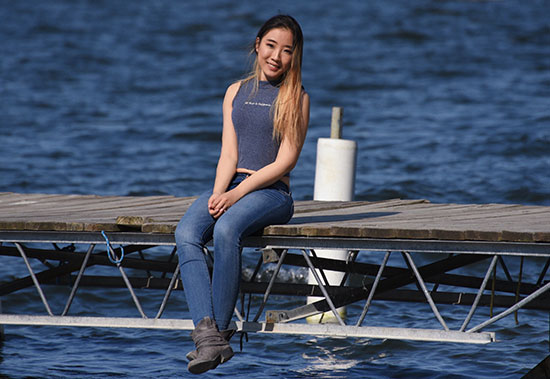
Where did you grow up?
I grew up in Anhui, an inland province situated in eastern China that stretches over the Huai River, the Yangtze River, and Xin’an River. I lived many years in the capital city of the province, Hefei, a city with more than 2,000 years of history. The geography of Anhui Province is multifarious, which gives the province numerous beautiful landscapes and famous scenery and has inspired generations of writers, musicians, and film makers. Anhui is also the hometown of Lao Zi and Zhuang Zi, the two founders of Taoism, who lived in 722 BC–476 BC.
I always get a little carried away talking about my hometown. In fact, there are quite a lot of similarities between Wisconsin and Anhui. Agriculture is at the heart of the state and province and, similar to Wisconsinites, folks in Anhui are honest, warmhearted, and enjoy their booze.
Life Notes
Number of years in practice: 1
Undergraduate school & degree: Anhui University of Finance and Economics, Bachelor of Laws, 2015
Law school & year graduated: LL.M., U.W. 2017; passed Wisconsin bar exam, 2019
Favorite quote: “Opportunities multiply as they are seized.” – Sun Tzu
Favorite book: Romance of the Three Kingdoms, a novel by Luo Guanzhong. For English readers, I recommend the two translations: one done by Moss Roberts, which is the most academic version, and the latest published translation done by Martin Palmer, which is an easier read.
Hobbies: Sing and play guitar, read, travel
Current employer: Levine Eisberner LLC, Madison
Contact: nikki@leattys.com
What is your family like?
I think my family is not much different from any others. I am the only child of my parents, who offered me unconditional love and support over the years. One thing I would say is a little special about my parents is that they see me for who I am, not who they hope I will become, which, if you know the stereotype, is not too common among Asian parents their age.
As a legal professional himself, my dad never tried to force on me the idea that I should follow his footsteps. On the contrary, he has been the biggest supporter of my decisions, whether it was auditioning for singing competitions, living in a foreign country, or going to law school. Due to this kind of parenting, I never really had a rebellious phase in my teenage years. I have always had great respect for my parents’ fairness, rationality, and sense of responsibility, and I hope one day to live up to the model set by them.
What inspired you to be a lawyer?
To say my family inspired me sounds like a cliché, but it is the truth. Two of my closest family members, my dad and my grandfather from my mother’s side, are both legal professionals. My grandfather used to write little contracts with me so that I would be compensated for chores. These contracts got longer and more detailed over time as I realized that my grandfather would have a different interpretation of a term if I left it ambiguous.
I was an argumentative child (as an adult I learned to keep it at the job) and would always try to defend against an “injustice.” I remember, as a fourth-grader “advocate,” I presented “evidence” and delivered “arguments” in front of the school principal in an effort to speak up for a classmate who was bullied by the principal’s grandson. I was frustrated when the principal swept the whole thing under the rug, and I thought how wonderful it would be if I was a lawyer to right that wrong.
You received your law degree in China in 2015. How does a legal education in China differ from in the U.S.?
I can speak only from my own experience. The most fundamental and obvious distinction may be that in China, a student can choose law as an undergraduate major, while in the U.S., law school is graduate school only. Undergraduate in China is normally a four-year program, and the courses are divided into three categories. The first category is mandatory courses for every college student in China, including introduction to economics, basic history, and so on. The second category is the mandatory courses for law students, such as constitutional law, jurisprudence, civil law, criminal law, civil procedure, criminal procedure, and the like. The third category is optional courses depending on students’ interests; it could be law related such as employment law or family law, or non-law related such as appreciation of Chinese classical poetry. In contrast, the U.S. law school, as a graduate school aiming to train future law professionals, provides only law-related courses.
The legal system in the U.S. is a common-law system, which is a collective name for legal systems that are primarily based on judicial precedents. The Chinese legal system is primarily influenced by the continental (or Romano-Germanic) legal system, which places the main emphasis on a set of core principles that are codified into a single referrable system serving as the primary source of law. Due to the differences in legal systems, you can imagine the focuses of our legal education would differ: While U.S. law professors emphasize case-law study, Chinese law professors concentrate on interpretation of statutes. I feel fortunate enough to have been trained by both types of legal education, which offer me different perspectives and sometimes inspirations when I approach challenging questions in law.

What legal work did you do in China, and for how long?
During my undergraduate years, I clerked at Intermediate People’s Court, which is the equivalent of a state’s appellate court in the United States. I also worked briefly at a medium-sized law firm in China.
I understand a lot of people are curious about the situation of women in the Chinese legal professions. The law school gender ratio in China these days is roughly half and half and, in some years, female students could outnumber male students. However, like the United States, women in the Chinese legal profession still face barriers and implicit bias. My experience was, although the employee gender ratio in the law firm I worked in was roughly half and half, women are clearly outnumbered by men at the management level. But at the same time, I do not want to overlook progress made over the years for gender equity in our profession.
I regularly chat with my female friends from law school in China and I am extremely proud of their amazing achievements in their current careers. One of my friends told me that her law firm in Shanghai just elected 10 partners, of whom four are women. I would call that progress.
What brought you to the U.S., Wisconsin in particular?
One day while roaming on campus (in China), I saw a notice outside a building stating that the U.W. Law School was interviewing potential candidates for its LL.M. (Master of Laws) program. I had thought about studying abroad in the past because I was interested in learning more about a different legal system, but at that time, it was still just an idea. I decided to do the interview with the intention of learning more about the school and the program and ended up having a great conversation with the U.W. Law School’s faculty. Inspired by the school’s renowned faculty and outstanding learning environment, I packed my suitcase and left for Wisconsin.
Tell us about your admission to practice in Wisconsin.
Wisconsin allows graduates of foreign law schools to take the state’s bar exam upon completion of a LL.M. degree from a U.S. law school. I attended the U.W. Law School to earn a LL.M. degree. Shortly after, I passed the bar exam, earning my admission to the State Bar of Wisconsin and the practice of law in Wisconsin.
How are you using your law degree today?
As an associate attorney at Levine Eisberner, my practice focuses on cases involving personal injury, civil litigation, corporations and business entities, and more. I take pride in giving a voice to people and families who need help battling powerful adversaries and achieving justice for those who have been wronged. I especially have deep sympathy for accident victims who have suffered great loss from a catastrophic injury, and bringing them comfort, resolution, and closure gives me a sense of purpose.
You are fluent in Mandarin. How does this skill come into play in your work?
At the moment, most of my clients are Wisconsinites with whom I do not need to speak Mandarin. I have had opportunities to work with a few Mandarin speakers within the short period of time here. I am confident that, with so much business being conducted online, many companies are looking for opportunities to serve a global market and bilingualism will come in handy when providing legal services in such situations.
What are some differences between living in China and Wisconsin?
One thing I have noticed in Wisconsin (or maybe the U.S. in general) is that people enjoy cold beverages way more than the hot ones, which is the other way around in China. I am by no means qualified to speak on Chinese philosophy on health, but I think the custom of drinking hot water in China comes from the idea of balancing yin and yang. If you are in a cold (yin) environment, drinking hot water could prevent yin overtaking the yang in your body. I guess the idea still makes sense in the context of modern science. However, in Wisconsin, I see people drinking iced coffee or soda on the street all the time, even during the famously brutal Wisconsin winter. I was shocked when I saw it the first time and held on tighter to my hot tea.
Wisconsin is also way more spread out than most places where I have lived. When I first looked out of the window on my plane, I was deeply impressed by the large green spaces and bodies of water. Years later, I am still in great appreciation when hiking the well maintained and preserved parks and thankful for such great opportunities to stay close and connected to nature.
What is one thing you’d like others to know about Chinese culture or its values?
There are a lot of traditional cultural values that influence the psyche of the Chinese people, some of them are shared with other cultures in the world. Of these, the core value is harmony. The value of harmony is properly coordinating different things by bringing them together in the appropriate manner, which allows them to develop from an uncoordinated state to one of coordination. Harmony could be applied to relationships between humankind and nature, between people and society, and between members of different communities.
For a society, the tricky part about achieving harmony is balancing individualism and collectivism, which is a puzzle that a lot of countries, including the United States and China, are facing.
If you had a day to yourself, what would you do?
I would take a day trip to a nearby city. Any recommendations?
» Cite this article: 94 Wis. Law. 12-14 (June 2021).
Meet Our Contributors
What is the best career advice you have received?
 One of the best pieces of career advice I have received is stay current and adapt to changes. This piece of advice comes from an excellent attorney who owns a successful law firm that has offices in several different countries. He said that the legal profession continues to evolve and has undergone fundamental and permanent change in the past decade. Instead of sticking your head in the sand, you should take charge in understanding the direction of this change and prepare yourself to remain relevant, secure, and marketable.
One of the best pieces of career advice I have received is stay current and adapt to changes. This piece of advice comes from an excellent attorney who owns a successful law firm that has offices in several different countries. He said that the legal profession continues to evolve and has undergone fundamental and permanent change in the past decade. Instead of sticking your head in the sand, you should take charge in understanding the direction of this change and prepare yourself to remain relevant, secure, and marketable.
At a time in which there were very few international law firms, he saw the great impact of globalization on economic growth in the past few decades and decided to take advantage of such opportunities by opening foreign offices that could provide legal services on a global scale. He believes that this move eventually saved and defined his career, and “being first” can be really advantageous.
Nikki Yang, Levine Eisberner LLC, Madison
Become a contributor! Are you working on an interesting case? Have a practice tip to share? There are several ways to contribute to Wisconsin Lawyer. To discuss a topic idea, contact Managing Editor Karlé Lester at (800) 444-9404, ext. 6127, or email klester@wisbar.org. Check out our writing and submission guidelines.
